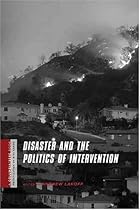Disaster and the Politics of Intervention (A Columbia / SSRC Book (Privatization of Risk))

| Author | : | |
| Rating | : | 4.50 (759 Votes) |
| Asin | : | 0231146973 |
| Format Type | : | paperback |
| Number of Pages | : | 160 Pages |
| Publish Date | : | 2014-03-17 |
| Language | : | English |
DESCRIPTION:
Collier, of Biosecurity Interventions: Global Health and Security in Question. His current research concerns the intersection between global health and national security in the development of approaches to new biological and environmental threats.. He is the author of Pharmaceutical Reason: Knowledge and Value in Global Psychiatry, and coeditor, with Stephen J. Andrew Lakoff is associate professor of anthropology, sociology and communica
NewmanPensions, Social Security, and the Privatization of RiskEdited by Mitchell A. WrightHealth at Risk: America's Ailing Health System-and How to Heal ItEdited by Jacob S. HackerLaid Off, Laid Low: Political and Economic Consequences of Employment InsecurityEdited by Katherine S. However, the recent drive to replace public institutions with market mechanisms has challenged governmental efforts to manage collective risk. Additional Columbia / SSRC books on the Privatization of Risk and its Implications for Americans Bailouts: Public Money, Private ProfitEdited by Robert E. Orenstein. Government plays a critical role in mitigating individual and collective vulnerability to disaster. Through measures such as disaster relief, infrastructure development, and environmental regulation, public policy is central to making societies more resilient. The contributors to this volume analyze the respective roles of the public and private sectors in the management of catastrophic risk, addressing questions such as: How should homeland security officials evaluate the risk posed by terrorist attacks and natural disasters? Are market-based interventions likely to mitigate our vulnerability to the effects of climate change? What is the appropr
Disaster, from the climate and the hands of man, may well be the problem of the twenty-first century. This brilliant volume introduces new and important ways to think about catastrophe, politics, and risk. (Eric Klinenberg, New York University, author of Heat Wave: A Social Autopsy of Disaster in Chicago and Fighting for Air: The Battle to Control America's Media) . It is required reading, not just for social scientists who study crises, but for anyone who cares about preventing them as well
